Have you ever met a small dog breed that is as adorable and playful as a Bichon Frise? These fluffy companions are like a burst of sunshine, with their curly white coats and round dark eyes that can melt your heart.
But there's more to these dogs than just their good looks. Bichon Frises are known for their friendly and affectionate nature, making them the perfect fit for any family. They love to play and have endless energy, keeping you entertained for hours.
But that's just the beginning of what makes them so special. Stay tuned to discover the health and care needs, training tips, and the importance of exercise and mental stimulation for these lovable furballs.
Key Takeaways
- The Bichon Frise is a small-sized dog breed with a fluffy white coat and round dark eyes.
- They have a friendly and playful temperament, making them good companions for children and other pets.
- The Bichon Frise is intelligent and highly trainable, responding well to positive reinforcement training methods.
- Regular grooming, exercise, and dental care are necessary for their health and well-being.
Appearance and Physical Characteristics
The Bichon Frise is a small-sized dog breed known for its fluffy white coat, round dark eyes, and curled tail carried over the back. These adorable dogs have a well-proportioned body structure that adds to their charm.
With their friendly and affectionate nature, they make great companions for families and get along well with children and other pets. Bichon Frises are intelligent and eager to please, which makes them highly trainable. However, they can be prone to separation anxiety if left alone for long periods.
Regular grooming is necessary to maintain their coat health, and moderate exercise is needed to prevent obesity. With a lifespan ranging from 12 to 15 years on average, the Bichon Frise requires regular veterinary check-ups and vaccinations to ensure their well-being.
Temperament and Personality
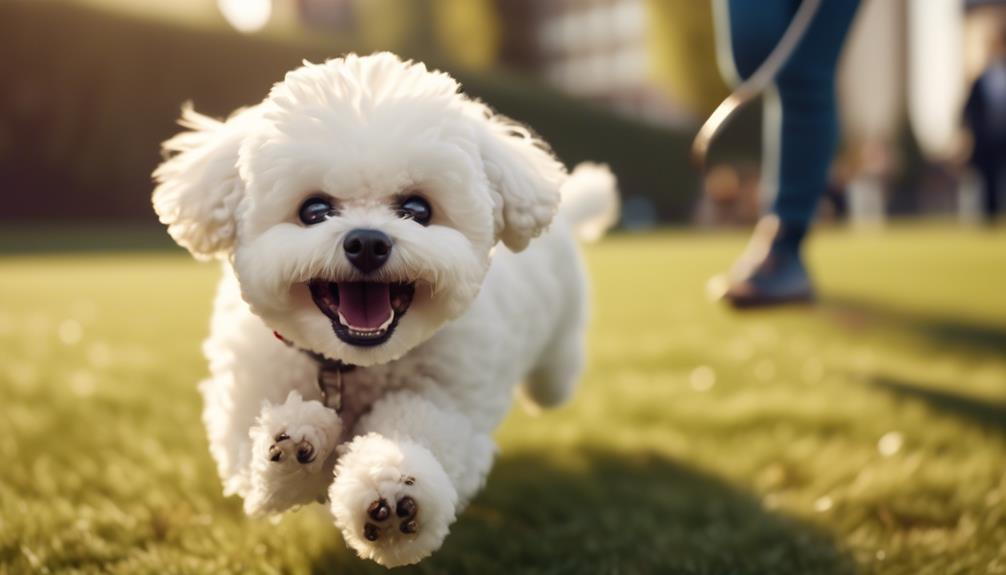
Bichon Frises are known for their friendly and affectionate nature, making them wonderful companions for families. They have a playful and lively personality, which adds joy and laughter to your home. These adorable dogs are good with children and other pets, making them a great addition to multi-pet households. Their intelligence and eagerness to please make them highly trainable, allowing you to teach them tricks and commands easily. However, they can be prone to separation anxiety if left alone for long periods, so it's important to give them the attention and companionship they crave. To give you a better idea of the Bichon Frise's temperament and personality, take a look at the table below:
| Temperament | Personality |
|---|---|
| Friendly | Playful |
| Affectionate | Lively |
| Good with children | Good with other pets |
| Intelligent | Eager to please |
Health and Care
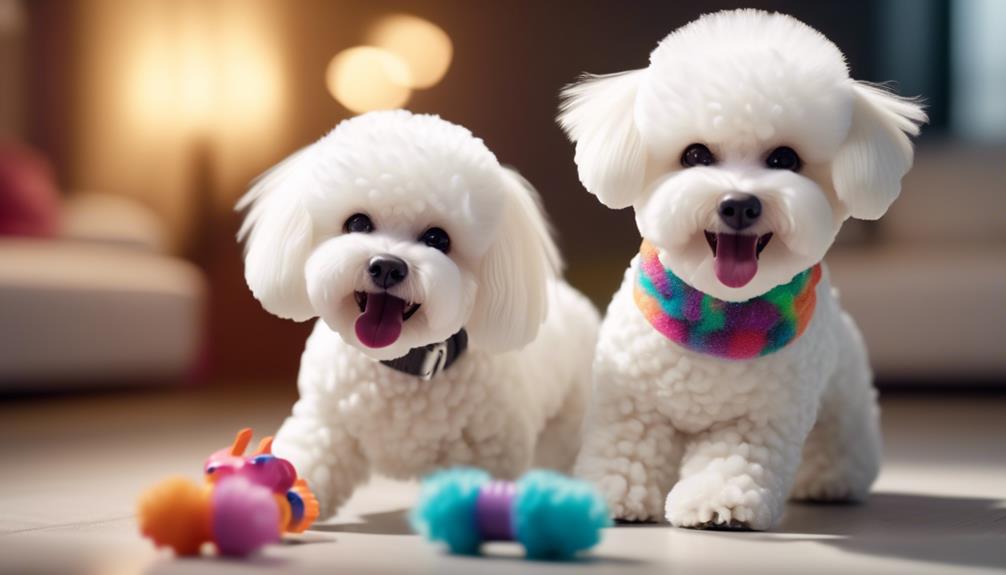
Now let's move on to the important topic of taking care of your Bichon Frise's health and well-being.
The Bichon Frise is generally a healthy breed, but they can be prone to certain genetic conditions such as allergies and dental problems. Regular grooming is required to maintain their coat health, and they've moderate exercise needs to prevent obesity.
On average, they've a lifespan of 12 to 15 years. It's important to schedule regular veterinary check-ups and vaccinations to ensure their overall health. Proper dental care is also crucial to prevent dental diseases.
Providing a safe and comfortable living environment is essential for their well-being. By taking proper care of your Bichon Frise's health, you can ensure they live a happy and healthy life.
Training and Socialization
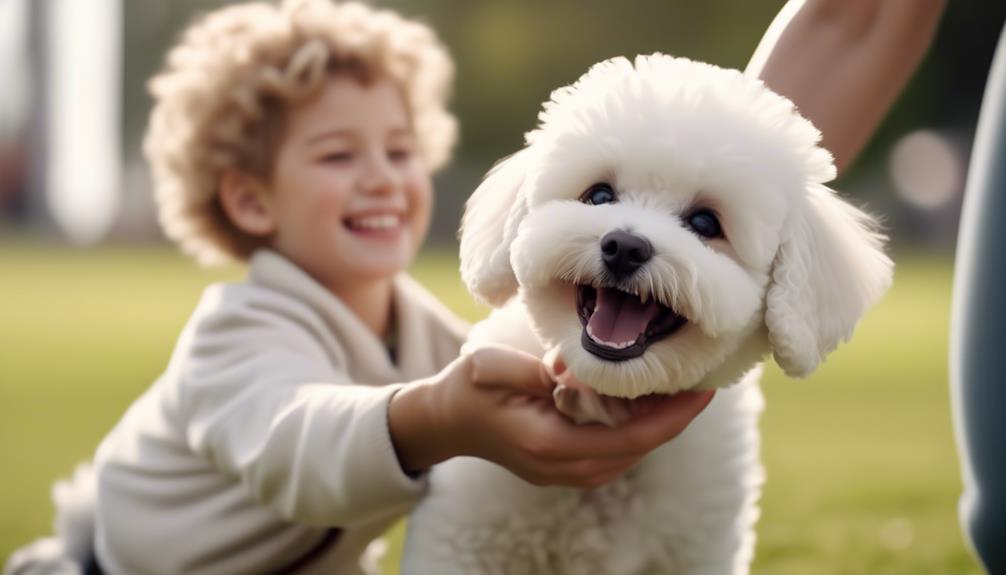
To ensure a well-behaved and socially confident Bichon Frise, proper training and socialization are essential. Here are some key points to consider:
- Training:
- Responds well to positive reinforcement training methods
- Highly trainable and quick learners
- May be prone to barking if not properly trained
- Can participate in various dog sports and activities
- Socialization:
- Socialization from an early age is important to prevent shyness
- Introduce your Bichon Frise to different people, animals, and environments
- Encourage positive experiences and interactions
- Help your dog learn appropriate behavior and manners
Exercise and Mental Stimulation
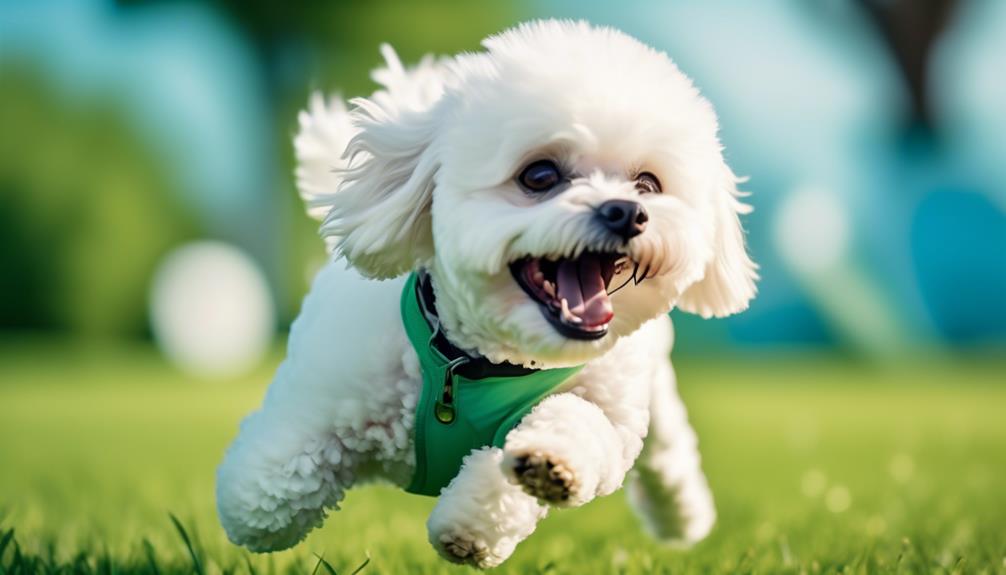
Regular exercise and mental stimulation are crucial for the overall well-being of the Bichon Frise. This playful and energetic breed thrives on daily physical activity to keep them mentally and physically stimulated. A lack of exercise can lead to boredom, which may manifest in destructive behavior. To ensure your Bichon Frise remains happy and healthy, provide them with opportunities for both physical exercise and mental stimulation. Here is a table showcasing some ways to achieve this:
| Physical Exercise | Mental Stimulation |
|---|---|
| Daily walks | Puzzle toys |
| Playtime in a yard | Training sessions |
| Agility courses | Interactive games |
Grooming and Coat Maintenance
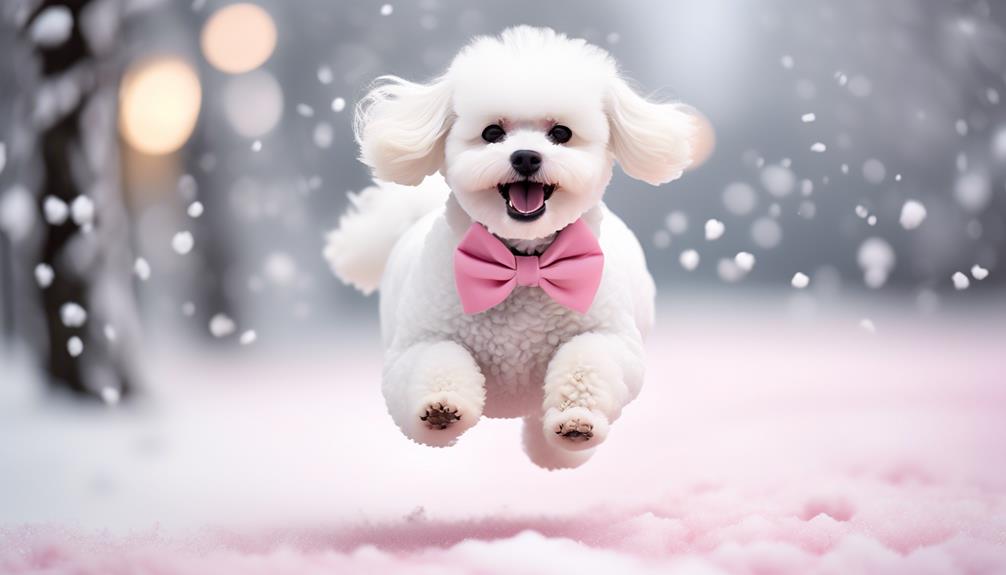
Ensuring the well-being of your Bichon Frise includes regular grooming and coat maintenance. Proper grooming not only keeps your Bichon looking adorable, but it also helps to keep their coat healthy and free from tangles and mats. Here are some important points to consider when it comes to grooming and coat maintenance:
- Regular brushing: Brush your Bichon's coat at least two to three times a week to prevent matting and to keep their coat looking its best.
- Bathing: Give your Bichon a bath every four to six weeks, using a gentle dog shampoo. Be sure to thoroughly rinse out all the shampoo to prevent skin irritation.
- Trimming: Regularly trim your Bichon's hair around the eyes, ears, paws, and bottom to keep them clean and free from debris.
- Professional grooming: Consider taking your Bichon to a professional groomer every six to eight weeks for a full grooming session, which includes a haircut, nail trimming, and ear cleaning.
- Dental care: Don't forget to brush your Bichon's teeth regularly to prevent dental problems.
Common Genetic Conditions
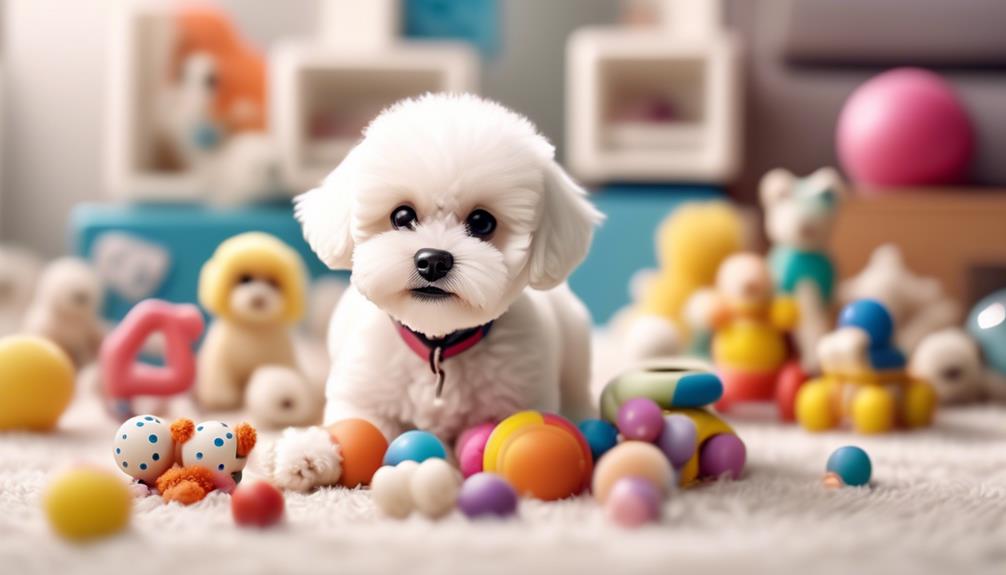
One important aspect to consider when owning a Bichon Frise is the prevalence of common genetic conditions. While the breed is generally healthy, there are certain conditions that they may be prone to. These conditions include allergies and dental problems. Regular veterinary check-ups and proper dental care are necessary to ensure the dog's well-being. To help you understand the genetic conditions that Bichon Frises may face, here is a table outlining some common conditions and their characteristics:
| Condition | Symptoms | Treatment |
|---|---|---|
| Allergies | Itchy skin, ear infections | Allergy medication, hypoallergenic diet |
| Dental problems | Tooth decay, gum disease | Regular teeth brushing, dental cleanings |
| Patellar luxation | Lameness, difficulty walking | Surgical correction |
| Juvenile cataracts | Cloudy or opaque eyes, vision impairment | Surgery |
Being aware of these conditions and providing proper care can help ensure the health and happiness of your Bichon Frise.
Lifespan and Veterinary Care
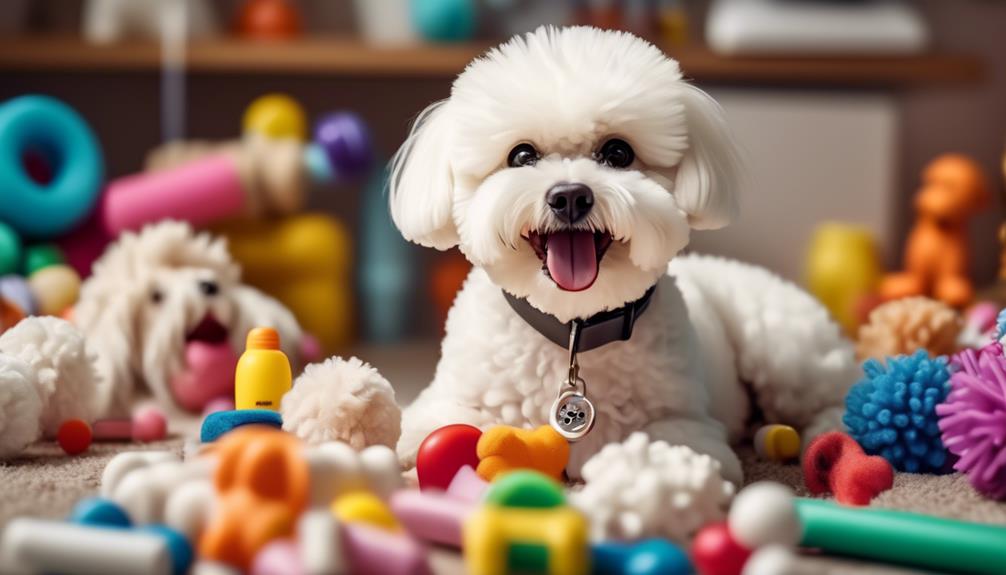
When it comes to the lifespan and veterinary care of your Bichon Frise, it's important to prioritize their health and well-being. Here are some key points to consider:
- Lifespan: Bichon Frises typically live for about 12 to 15 years on average, but with proper care, they can live even longer.
- Regular Veterinary Check-ups: Schedule regular visits to the veterinarian to ensure your Bichon Frise is in good health. These check-ups are essential for early detection and prevention of any potential health issues.
- Vaccinations: Keep your Bichon Frise up to date with vaccinations to protect them against common diseases.
- Dental Care: Proper dental care is crucial for your Bichon Frise's overall health. Regular teeth brushing and professional cleanings can help prevent dental diseases.
- Grooming: Bichon Frises have a fluffy white coat that requires regular grooming to maintain its health and appearance.
- Exercise: Provide your Bichon Frise with daily exercise to keep them physically and mentally stimulated.
Dental Care and Oral Health
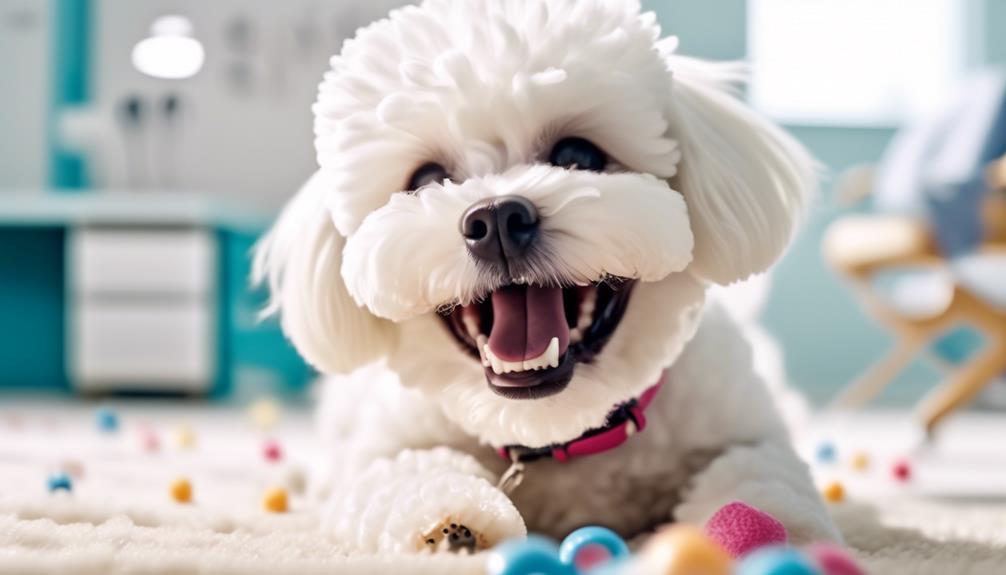
Taking care of your Bichon Frise's dental health is essential for their overall well-being. Like humans, dogs can develop dental problems such as plaque buildup, gum disease, and tooth decay. Regular dental care can help prevent these issues and keep your Bichon Frise's teeth and gums healthy.
Start by brushing their teeth regularly using a dog toothbrush and toothpaste. You can also provide dental chews or toys that promote chewing, which helps to reduce plaque and tartar buildup.
Additionally, it's important to schedule regular dental check-ups with your veterinarian to catch any potential dental problems early on.
Creating a Safe Living Environment
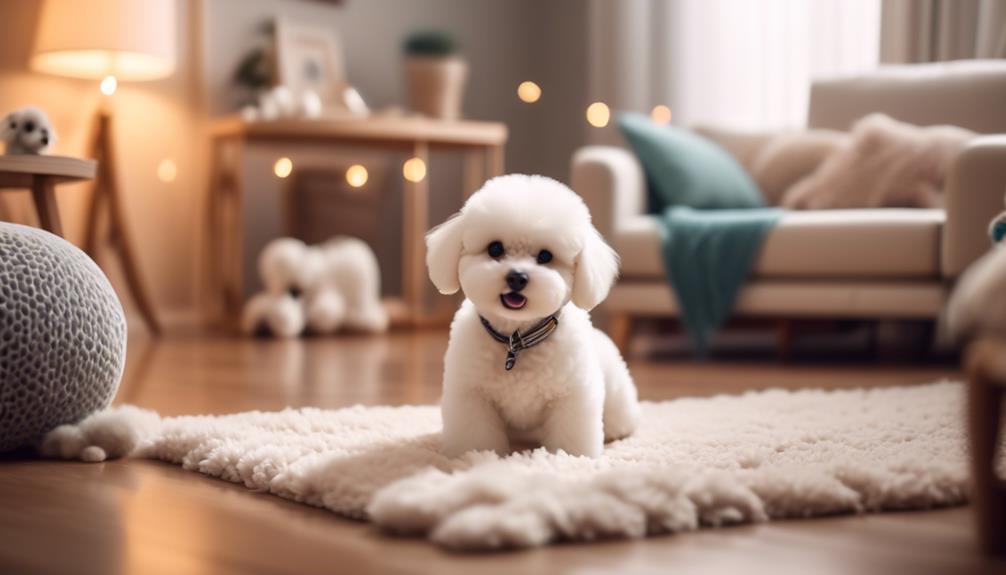
To ensure the well-being of your Bichon Frise, it's important to create a safe living environment that promotes their safety and comfort. Here are some tips to help you achieve this:
Indoor safety measures:
- Keep toxic substances, such as household cleaners and medications, out of reach.
- Secure electrical cords and outlets to prevent chewing accidents.
- Provide a designated area for your Bichon Frise with their bed, toys, and water bowl.
- Use baby gates or closed doors to restrict access to hazardous areas.
Outdoor safety precautions:
- Ensure your yard is securely fenced to prevent your Bichon Frise from wandering off.
- Remove any toxic plants or chemicals from the yard.
- Provide shade and fresh water for your dog when spending time outside.
- Regularly check for any potential hazards, such as sharp objects or holes.
Participating in Dog Sports and Activities
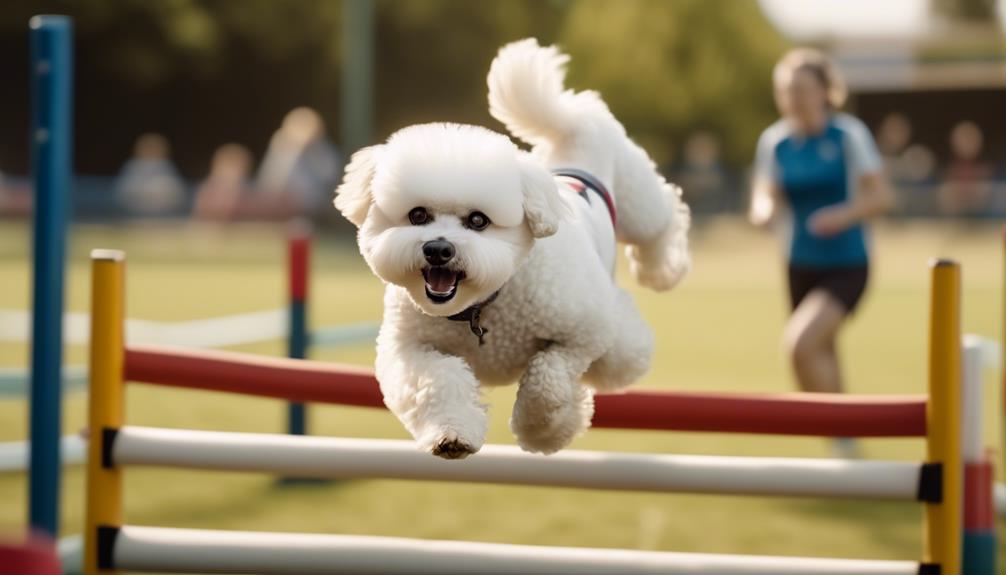
Engage your Bichon Frise in a variety of dog sports and activities to keep them mentally and physically stimulated. Bichon Frises are energetic and playful, making them well-suited for participating in various activities.
One popular option is agility training, where they can navigate through obstacle courses and showcase their athleticism.
Another option is obedience training, which not only provides mental stimulation but also helps them develop good manners and social skills.
Bichon Frises also enjoy participating in flyball, where they can showcase their speed and agility by racing against other dogs.
Additionally, they can participate in tracking and scent work, using their keen sense of smell to locate hidden objects or track scents.
Engaging your Bichon Frise in these activities won't only keep them physically fit but also provide them with mental enrichment and a sense of fulfillment.
Frequently Asked Questions
Are Bichon Frises Hypoallergenic?
Yes, Bichon Frises are hypoallergenic. Their fluffy white coat doesn't shed much, reducing the amount of allergens in the environment. However, individual reactions may still vary, so it's best to spend time with one to be sure.
How Often Should a Bichon Frise Be Groomed?
You should groom your Bichon Frise every 4-6 weeks to keep their coat looking fluffy and healthy. Regular grooming is important to prevent matting and maintain their overall appearance.
Do Bichon Frises Require a Lot of Exercise?
Yes, Bichon Frises require daily exercise to keep them mentally and physically stimulated. They are a playful and lively breed, so regular exercise is important to meet their needs.
What Are Some Common Health Issues in Bichon Frises?
Common health issues in Bichon Frises include allergies, dental problems, and genetic conditions. Regular grooming and dental care are important. Exercise them moderately to prevent obesity. Remember, "an ounce of prevention is worth a pound of cure!"
Can Bichon Frises Be Left Alone for Long Periods of Time?
No, Bichon Frises can't be left alone for long periods. They can experience separation anxiety. It's important to provide them with companionship and a safe environment for their well-being.
Are Bichon Frise and Brussels Griffon Playful and Adorable Breeds?
Yes, Bichon Frise and Belgium’s adorable Brussels Griffon are playful and adorable breeds. Both breeds are known for their cheerful and affectionate nature. They love to play and interact with their owners, making them great companions for families and individuals alike.
Conclusion
So, if you're looking for a small-sized dog breed that isn't only adorable but also incredibly playful, the Bichon Frise is the perfect choice for you.
Don't let their fluffy appearance fool you, these dogs are full of energy and love to play.
And even though they're small, they get along well with children and other pets.
So why wait? Bring home a Bichon Frise and experience the joy and love they bring to your family.




